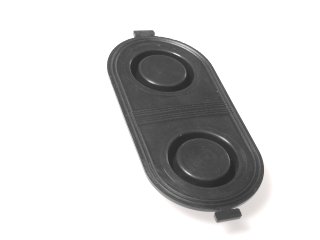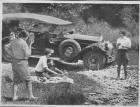|
BTV moisture contamination.
|
||||
|---|---|---|---|---|
|
Home away from home

|
Suppose the remote fill option for the BTV is installed. Would such an installation reduce moisture collection in the fluid by a significant reduction????
Further suppose that the REMOTE fill reservoir is modified to act as or be replaced with a modern sealed type reservoir. Would such a minor effort not reduce brake fluid absorption of moisture significantly or eleminate it completely???? THUS extending the service recommendation of draining and flushing and renewing the brake fluid from every 3 to 5 years to at least 10 - 12 years. No?
Posted on: 2010/5/21 10:15
|
|||
|
VAPOR LOCK demystified: See paragraph SEVEN of PMCC documentaion as listed in post #11 of the following thread:f
packardinfo.com/xoops/html/modules/newbb/viewtopic.php?topic_id=7245 |
||||
|
||||
|
Re: BTV moisture contamination.
|
||||
|---|---|---|---|---|
|
Forum Ambassador
|
BTV is an abbreviation several on the forum use for the power brake unit. It is short for Bendix Treadle-Vac or as Packard called that unit in their marketing, EasaMatic
Posted on: 2010/5/21 18:06
|
|||
|
||||
|
Re: BTV moisture contamination.
|
||||
|---|---|---|---|---|
|
Forum Ambassador

|
Is the master cylinder cover and vented fill plug really exposed to that much water?
I doubt if the factory-approved, remote reservoir accessory, alone, would give you what you are looking for. Though mounted up high on the firewall, that remote reservoir is not sealed to atmosphere - the cap is vented. To better seal the BTV reservoir, you could replace the vented fill plug with a fitting and tube that runs to a remote reservoir - as the the original accessory does. However, you will have to come up with a remote reservoir that uses a cap that incorporates a diaphragm - as introduced on brake master cylinders in the mid-1960s. The problem is that DOT3/4 is hygroscopic - will draw moisture right out of the atmosphere. However, I've read that it will even pull moisture right through rubber. IMHO, then, sealing the BTV system to atmosphere will only delay the inevitable. Although my '75 Cosworth Vega has only 13K on the clock, I found rust sediment in the bottom of the tandem m/ca reservoir - in spite of its diaphragm-type cap. I suctioned the fluid out of the reservoir, daubed the sediment up with a clean cloth and Q-tips, and then refilled and bled the brakes - pushing a quart of fluid through to flush the hydraulic system. What came out at the wheel cylinders, initially, looked awful. All things considered, I'd just as soon flush and bleed the system periodically or convert to DOT5. Most old car clubs seem to recommend flushing systems every few years moisture and other contaminents - not just for cars with the BTV. An added benefit of bleeding is that it often reveals plumbing issues - before it's too late.
Posted on: 2010/5/22 9:22
|
|||
|
||||
|
Re: BTV moisture contamination.
|
||||
|---|---|---|---|---|
|
Just can't stay away

|
OK,
Thanks HH56 ! Xavier
Posted on: 2010/5/22 16:40
|
|||
 PONTIAC FIREBIRD 3.1 V6 '91 + FIREBIRD Esprit 4.1 L6 '80 + CHEVROLET CAPRICE Wagon 5.0 V8 '87 [img]http://uniform.messageboard.nl/10060/images/smiles/fl PONTIAC FIREBIRD 3.1 V6 '91 + FIREBIRD Esprit 4.1 L6 '80 + CHEVROLET CAPRICE Wagon 5.0 V8 '87 [img]http://uniform.messageboard.nl/10060/images/smiles/fl
|
||||
|
||||
|
Re: BTV moisture contamination.
|
||||
|---|---|---|---|---|
|
Forum Ambassador

|
Just to be clear about it, the propensity for traditional brake fluids to absorb moisture is inherent in the fluid, and not something that is unique about the design of the BTV. All hydraulic brake systems of the era were the same in that, as the brakes are applied and fluid is displaced to the wheel cylinders, the level in the master drops and air must be admitted to replace the displaced volume of fluid. Similarly when the brakes are released and the extra fluid in the wheel cylinders returns to the master, the fluid level rises and displaces the air thru the cap vent which is a needed feature of the system. The system must have a vent.
Posted on: 2010/5/22 17:22
|
|||
|
||||
|
Re: BTV moisture contamination.
|
||||
|---|---|---|---|---|
|
Forum Ambassador

|
Agreed - the problem is, first and foremost, with the hygroscopic nature of glycol-based DOT3 and DOT 4 fluids. Then, ANY master cylinder that is directly vented to atmosphere would be more prone to fluid contamination than a sealed system.
However, fluid movement to and from the reservoir of a tandem master cylinder that is sealed with a diaphragm-type cap should be no different than with the fully-vented cap in the BTV. The diaphragm in the cap of any sealed system that I've inspected is made of a flexible, convoluted material, which folds up on itself, but will project down into the reservoir when pressure in the reservoir is less than atmospheric pressure. Thus, the diaphragm keeps moisture and other contaminants out, while allowing fluid to move freely within the sealed system. Since a picture is so often worth a thousand words, here's a bottom's-up view of a simple diaphragm used on '64-'66 Mustang:  However, there may be another benefit to having a sealed system on these old cars. In recent years, I've heard several reports from Packard owners regarding a mysterious "loss" of fluid, and I have experienced this, myself, with my own Packards in long-term storage. Yet, after I top off the reservoir, the system presents no leaks. In my case, I have posited that this "loss" is a result of the fluid condensing, by volume, due to evaporation of some "volatile" component of the DOT 3/4 brake fluid over extended periods of time. Many of us have seen the end result in a field-car or barn-find: a brake system full of sludge or wax-like, nearly-crystallized crud. Yet, before it ever gets to that extreme condition in a drivable vehicle, I am concerned that the condensing fluid might develop "clots" that would affect hydraulic performance - including operation of the compensator port valve. A diaphragm sealing the system should greatly reduce that problem, but I don't know if it's really necessary to go to all that trouble of fabrication. Even if such a sealed, remote reservoir was available off-the-shelf, I would rather stick to periodic flushing and bleeding of the system. Perhaps even DOT5 should be purged and bled periodically in vented systems - though not as often as DOT3/4.
Posted on: 2010/5/23 9:24
|
|||
|
||||
|
Re: BTV moisture contamination.
|
||||
|---|---|---|---|---|
|
Home away from home

|
Is there ANY documentation by ANY MANUFACTURER that supports/specifies ANY specific periodic (in miles or time) DOT3 brake fluid procedure involving changing or draining or flushing or removal or replacement of the DOT3 brake fluid???
What about specific time/mileage intervals for rebuilding of ANY master cylinder that uses DOT 3????
Posted on: 2010/5/23 10:47
|
|||
|
VAPOR LOCK demystified: See paragraph SEVEN of PMCC documentaion as listed in post #11 of the following thread:f
packardinfo.com/xoops/html/modules/newbb/viewtopic.php?topic_id=7245 |
||||
|
||||
|
Re: BTV moisture contamination.
|
||||
|---|---|---|---|---|
|
Forum Ambassador

|
Perhaps even DOT5 should be purged and bled periodically in vented systems - though not as often as DOT3/4.
I'd strongly agree that DOT5 systems also need to be flushed and refilled, though I can't comment about the frequency. As the fluid level in the master rises and falls, moisture will be drawn in and expelled just as with any other fluid. The difference in the case of DOT5 is that the moisture is essentially insoluble in the fluid and thus won't be absorbed into the fluid, but will remain as discrete water droplets which will ultimately drop to the lowest point of the system because of the difference in density and at that point can initiate rust of the system internally as long as any dissolved oxygen is present.
Posted on: 2010/5/23 10:50
|
|||
|
||||
|
Re: BTV moisture contamination.
|
||||
|---|---|---|---|---|
|
Home away from home

|
IN over 40 years of near daily reading of various automoitve manuals such as Motors, CHiltons, Factory Service manuals, owners manuals, etc etc i have never seen nor heard of anything that vaguely resembles a specified periodic recommendation for anything that would resemble purging or replaceing of any brake fluid. Maybe i just missed it.
Posted on: 2010/5/23 11:03
|
|||
|
VAPOR LOCK demystified: See paragraph SEVEN of PMCC documentaion as listed in post #11 of the following thread:f
packardinfo.com/xoops/html/modules/newbb/viewtopic.php?topic_id=7245 |
||||
|
||||









